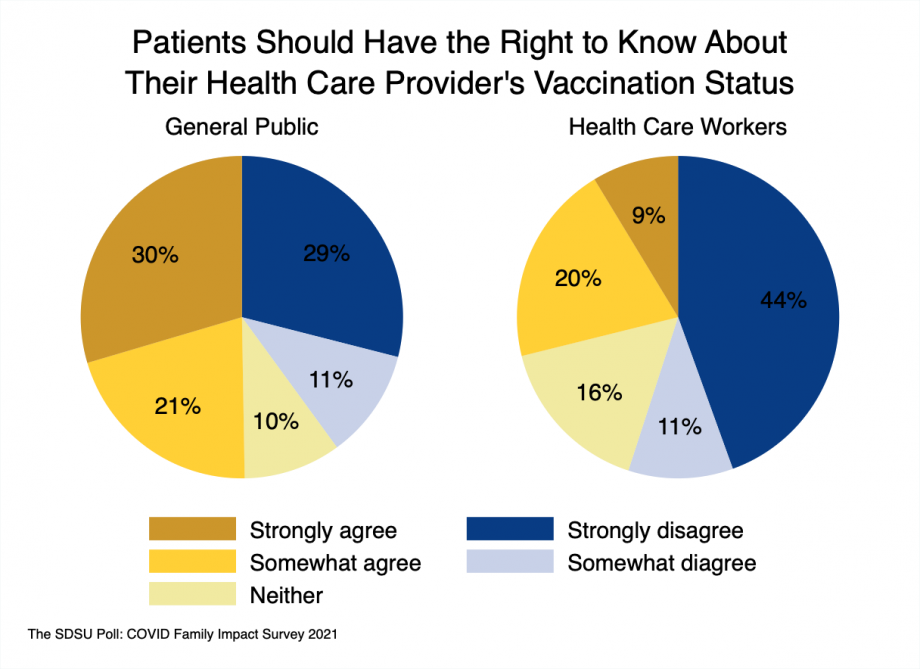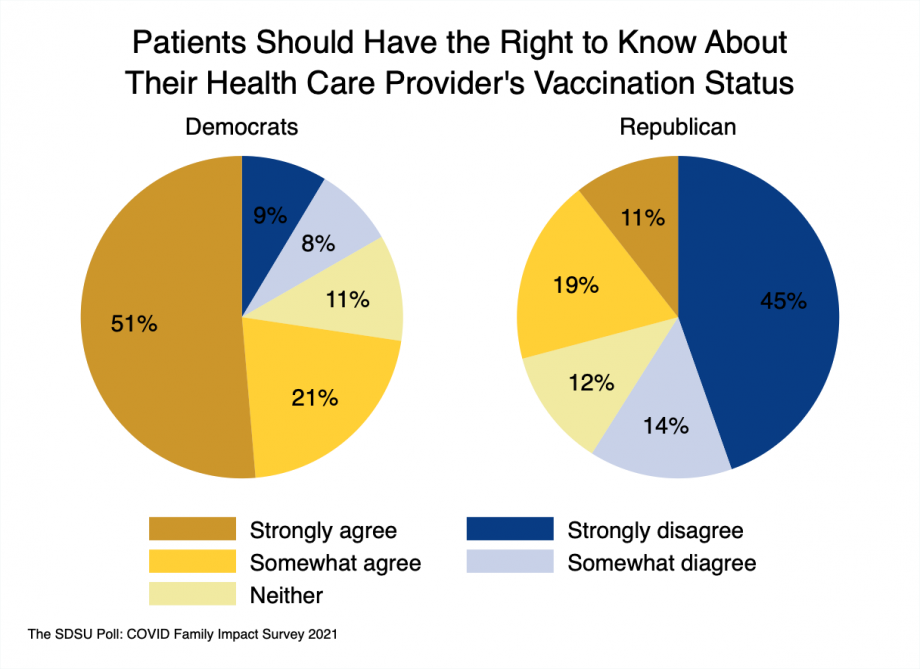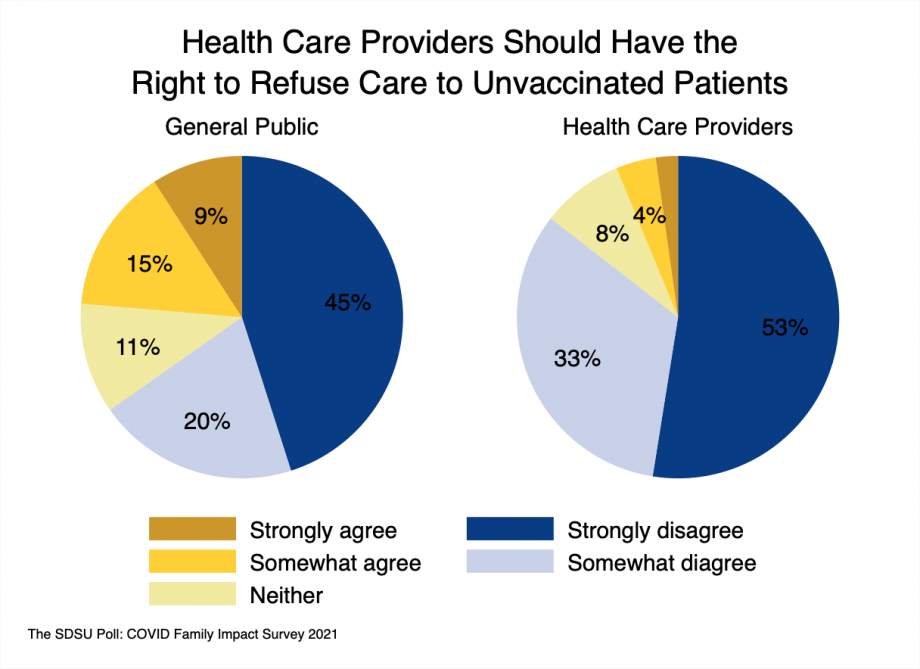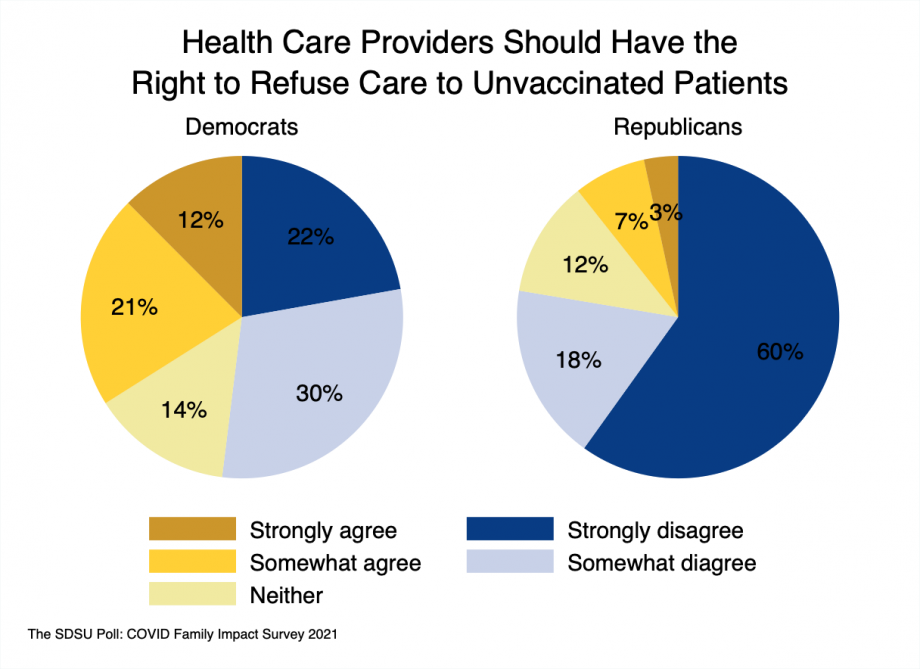The South Dakota COVID-19 Family Impact Survey 2021 was conducted from July 31 to Aug. 14, 2021 by The South Dakota Polling Project, a research group housed in the School of American and Global Studies at South Dakota State University. This survey builds upon similar surveys conducted by The South Dakota Polling Project in October 2020 and April 2021. In this poll, a total of 573 registered voters in South Dakota completed our survey about the impact of the COVID-19 pandemic on their daily lives. The margin of error of this survey was +/- 4 %, on par with other state-wide polls.
Patients’ Rights to Know Providers’ Status
Healthcare Providers Oppose Allowing Patients to Know Their Healthcare Providers’ Vaccination Status
Asking colleagues, friends, or relatives about their vaccination status is a socially sensitive matter, considering that just over half of South Dakotans are fully vaccinated. For the safety of themselves and others, some vaccinated people want to know the vaccination status of people that they interact with at work and in social settings. But what about patients having the right to know the vaccination status of their healthcare providers? This is precisely what The South Dakota Polling Project asked South Dakotans about in our most recent survey. We also asked our respondents if they work as a health care provider, thus allowing us to compare the opinions of providers and the general public. Just over half of the public (51%) say they agree or strongly agree that patients should have that right. However, less than a third of healthcare providers (29%) say the same. About 40% of the public disagrees or strongly disagrees, compared to 55% of the healthcare providers. About 10% of the public and 16% of healthcare providers state that they neither agree nor disagree.

Political Affiliation Influences Support for Patients' Right to Know their Healthcare Providers’ Vaccination Status
To a large degree, adherence to pharmaceutical and non-pharmaceutical measures to control the spread of COVID-19 is influenced by people’s political orientation. Indeed, politicization of this international health crisis is one of its defining features COVID response in the United States. Seven out of ten Democrats (73%) say they agree or strongly agree that patients should have the right to know their provider's vaccination status. Only 17% say they disagree or strongly disagree, while 11% say they neither agree nor disagree. As for Replications, three in ten (30%) say they agree or strongly agree, 59% say they disagree or strongly disagree and 12% state that they neither agree nor disagree. Independents (not shown) basically split the difference between two parties. Overall, the support for a patient’s right to know the vaccination status of their provider is highly structured by partisan identification.

Providers’ Right to Refuse Unvaccinated Patients
The rise of the highly contagious COVID-19 Delta variant coupled with vaccine hesitancy in the United States has prompted some businesses to require their employees - and sometimes their customers - to provide proof that they have been vaccinated. Some healthcare organizations and physicians in private practices also require proof of vaccination from patients and visitors for the sake of protecting healthcare providers and their patients. Some physicians even refuse to see unvaccinated patients. As of this writing, the Centers for Disease Control and Prevention (CDC) reports that 548,418 healthcare workers have been infected with COVID-19 and 1,749 have died. Critics argue that asking patients about their vaccination status is an invasion of their privacy, or it is a violation of the Health Insurance Portability and Accountability Act (HIPAA), though the latter is untrue.
Health Care Providers Themselves Object to Providers Refusing to See Unvaccinated Patients
We asked South Dakotans whether healthcare providers should have the right to refuse to see patients who are not vaccinated against COVID-19. The majority of the general public (65%) say they disagree or strongly disagree that providers should have that right. A much smaller percentage of South Dakota residents (24%) say they agree or strongly agree, while the rest (11%) say they neither agree nor disagree. Our data also shows that health care workers object more strenuously to this than the general public. Over eight in ten healthcare providers (86%) say they disagree or strongly disagree that healthcare providers should have that right, a figure that is much higher than the public at large. Only a very small percentage of healthcare providers, 6%, say they agree or strongly agree with this statement. Again, this is much smaller than the general public. Only 8% of the health care providers in our sample were unsure. Clearly, the overwhelming majority health care providers as a class see themselves as obliged to serve their patients regardless of vaccination status.

Partisan Identification Influences Attitudes about Healthcare Providers’ Right to Refuse to See Unvaccinated Patients
There is no doubt that political identification plays a major role in influencing Americans’ reactions to the COVID-19 pandemic. Analysis of the data shows that attitudes about health care providers’ right to refuse to see unvaccinated patients are strongly shaped by political affiliation. Nearly one in eight Republicans (78%), half of Democrats (52%) and 61% of Independents say they disagree or strongly disagree that healthcare providers should be given such a right. A smaller proportion of Republicans (10%) say they agree or strongly agree to allow healthcare providers to deny service to unvaccinated patients, compared to 33% of Democrats and 28% of Independents. Comparable percentages of Republicans (12%), Democrats (14%) and Independents (11%) say they neither agree nor disagree. Partisan identification evidently explains much of the differences in attitudes.

The take-away lesson, like most COVID-19 policy questions that we’ve dealt with in our surveys, is that partisanship remains one of the most robust determinants of people’s attitudes on most matters related to the pandemic. However, the public isn’t perfectly polarized on every COVID-19 policy matter, there are some policy areas where there is a fair amount of agreement. In coming press releases we will continue to look at a COVID related matters, including: the psychological effects on South Dakotans, conspiratorial beliefs people hold and questions on mandatory vaccinations for certain groups.
Contributors: Abdallah Badahdah PhD, Filip Viskupic PhD and David Wiltse PhD
- Contact:
- Telephone number: 605-688-6367
Republishing
You may republish SDSU News Center articles for free, online or in print. Questions? Contact us at sdsu.news@sdstate.edu or 605-688-6161.

